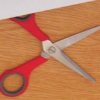Free Online Productivity Tools
i2Speak
i2Symbol
i2OCR
iTex2Img
iWeb2Print
iWeb2Shot
i2Type
iPdf2Split
iPdf2Merge
i2Bopomofo
i2Arabic
i2Style
i2Image
i2PDF
iLatex2Rtf
Sci2ools
94
Voted
ICIP
2006
IEEE
2006
IEEE
A Probabilistic Approach to Robust Shape Matching
We present a probabilistic approach to shape matching which is invariant to rotation, translation and scaling. Shapes are represented by unlabeled point sets, so discontinuous boundaries and non-boundary points do not pose a problem. Occlusions, significant dissimilarities between shapes and image clutter are explained by a `background model' and hence, their impact on the overall match is limited. By simultaneously learning a part decomposition of both shapes, we are able to successfully match shapes that differ as a result of independent part transformations ? a form of variation common amongst real objects of the same class. The effectiveness of the matching algorithm is demonstrated using the benchmark MPEG-7 data set and real images.
Benchmark Mpeg-7 Data | Discontinuous Boundaries | ICIP 2006 | Image Processing | Overall Match | Significant Dissimilarities | Unlabeled Point |
Related Content
| Added | 22 Oct 2009 |
| Updated | 27 Oct 2009 |
| Type | Conference |
| Year | 2006 |
| Where | ICIP |
| Authors | Graham McNeill, Sethu Vijayakumar |
Comments (0)

